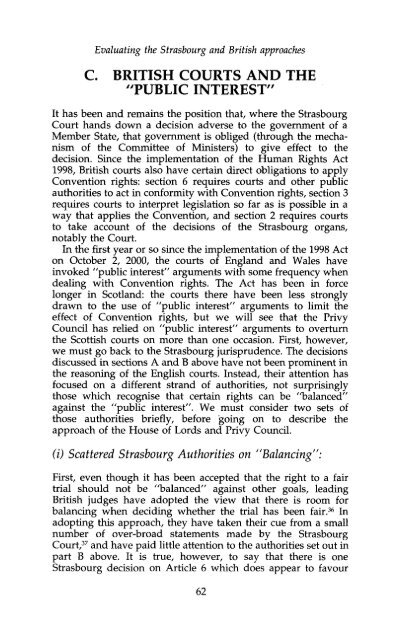Human Rights, Serious Crime and Criminal Procedure - College of ...
Human Rights, Serious Crime and Criminal Procedure - College of ...
Human Rights, Serious Crime and Criminal Procedure - College of ...
- No tags were found...
You also want an ePaper? Increase the reach of your titles
YUMPU automatically turns print PDFs into web optimized ePapers that Google loves.
Evaluating the Strasbourg <strong>and</strong> British approachesC. BRITISH COURTS AND THE"PUBLIC INTEREST"It has been <strong>and</strong> remains the position that, where the StrasbourgCourt h<strong>and</strong>s down a decision adverse to the government <strong>of</strong> aMember State, that government is obliged (through the mechanism<strong>of</strong> the Committee <strong>of</strong> Ministers) to give effect to thedecision. Since the implementation <strong>of</strong> the <strong>Human</strong> <strong>Rights</strong> Act1998, British courts also have certain direct obligations to applyConvention rights: section 6 requires courts <strong>and</strong> other publicauthorities to act in conformity with Convention rights, section 3requires courts to interpret legislation so far as is possible in away that applies the Convention, <strong>and</strong> section 2 requires courtsto take account <strong>of</strong> the decisions <strong>of</strong> the Strasbourg organs,notably the Court.In the first year or so since the implementation <strong>of</strong> the 1998 Acton October 2, 2000, the courts <strong>of</strong> Engl<strong>and</strong> <strong>and</strong> Wales haveinvoked "public interest" arguments with some frequency whendealing with Convention rights. The Act has been in forcelonger in Scotl<strong>and</strong>: the courts there have been less stronglydrawn to the use <strong>of</strong> "public interest" arguments to limit theeffect <strong>of</strong> Convention rights, but we will see that the PrivyCouncil has relied on "public interest" arguments to overturnthe Scottish courts on more than one occasion. First, however,we must go back to the Strasbourg jurisprudence. The decisionsdiscussed in sections A <strong>and</strong> B above have not been prominent inthe reasoning <strong>of</strong> the English courts. Instead, their attention hasfocused on a different str<strong>and</strong> <strong>of</strong> authorities, not surprisinglythose which recognise that certain rights can be "balanced"against the "public interest". We must consider two sets <strong>of</strong>those authorities briefly, before going on to describe theapproach <strong>of</strong> the House <strong>of</strong> Lords <strong>and</strong> Privy Council.(i) Scattered Strasbourg Authorities on "Balancing":First, even though it has been accepted that the right to a fairtrial should not be "balanced" against other goals, leadingBritish judges have adopted the view that there is room forbalancing when deciding whether the trial has been fair. 36 Inadopting this approach, they have taken their cue from a smallnumber <strong>of</strong> over-broad statements made by the StrasbourgCourt, 37 <strong>and</strong> have paid little attention to the authorities set out inpart B above. It is true, however, to say that there is oneStrasbourg decision on Article 6 which does appear to favour62
















